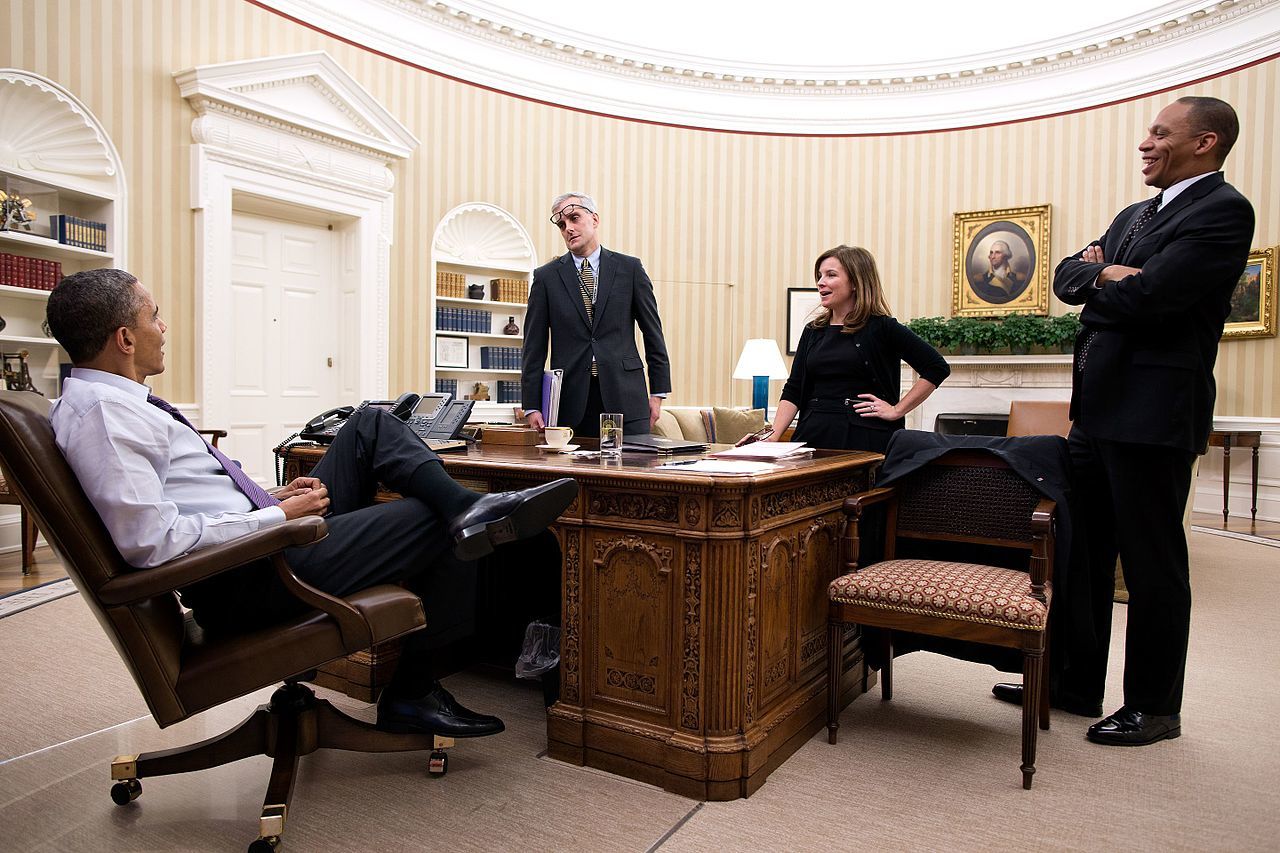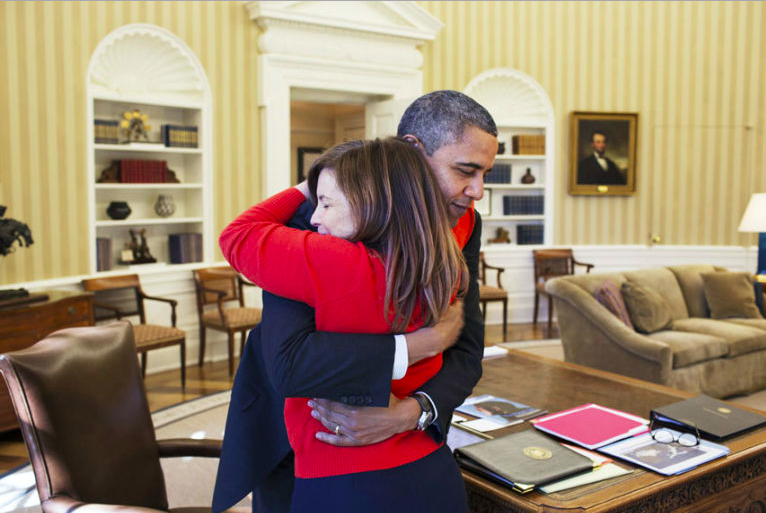It was Friday, October 5, 2008, and I was having a panic attack. I was working as the director of scheduling and advance for Barack Obama’s presidential campaign, and we were rounding the corner into the final month before the election. But the crisis before me in the Chicago headquarters that day had nothing to do with a bad debate performance, derailed travel schedule, or staff member saying something stupid to a reporter. I was freaking out because I love to smoke weed.
Quick background: Standard procedure for potentially incoming administrations is that senior staff members who need immediate security clearance have to start filling out their forms so they can hit the ground running if they win the election. That Friday, someone in our office got his SF86 form, the written questionnaire for national security positions, and since it was notoriously daunting, we all immediately swarmed him to see what it was about. Name, date of birth, social security number; height, weight, hair color. Police record, passport information. Pretty standard. Then, we flipped to page 93: “Illegal Use of Drugs and Drug Activity.”
Videos by VICE
Read more: A Letter to Young Women: How We Will All Move Forward Together Now
“In the last seven (7) years, have you illegally used any drugs or controlled substances? Provide the type of drug or controlled substance.” There were two columns of drugs and controlled substances. The second entry was “THC (Such as marijuana, weed, pot, hashish, etc.).”
I grew up listening to the Grateful Dead in upstate New York in the 90s. I went to the University of Vermont. What do you think my answer was?
To make things worse, the form asked for details: “estimate of the month and year of first use,” “estimate of the month and year of most recent use,” “nature of use, frequency, and number of times used.” It was like a nightmare version of when you go to the doctor and they ask when your last period was. I don’t know how I was so blindsided—how it had never occurred to me that there would be a drug test—but as soon as I saw those questions, I knew I would be getting one. I guess it was that I had worked for Barack Obama since 2005, the beginning of his time as a senator, and before that, I had worked on John Kerry’s presidential campaign—I thought I was a government veteran. But as (I hope) the current administration is learning the hard way, working in the White House is not like working anywhere else.
That night I went home and flushed all the pot I had stashed in my underwear drawer. I threw my pipe in the trash and took the trash to the chute. It wasn’t much—I smoked every once in a while on the campaign to help me get to sleep—and I never went to work, or anywhere, really, stoned. Though my usage peaked well after college, pot had been a friend for a very long time. It helped me sleep, calmed my IBS symptoms, chilled my anxiety, and cleared my head. I believed—and still believe—that weed should be legal. But I absolutely didn’t look back. I would just have to start drinking more wine.

Photo by Pete Souza via Wikimedia Commons
Shortly after you fill out the SF86, an FBI agent interviews you about your answers. She brought in my form, and soon, while I was talking very quickly and guiltily about a time in college I accidentally went to a strip club in Miami—she asked how many times had I smoked pot.
I said I didn’t know.
“More than 20?”
“Yes,” I replied. “More than 20.”
“More than 100?” I was sweating.
“Yes,” I said. “More than 100.”
“More than 500?”
“Just write unknown!” They were finally satisfied with, “More than 500 would be fair.”
Though the form asks you to go back seven years, in person they instruct you to go back to age 18, and they also made me list locations—I had to find the addresses of dorms that had been torn down since I lived in them.
It was like a nightmare version of when you go to the doctor and they ask when your last period was.
The final days of the campaign were hectic and nervous, and they passed without much incident on the weed front. FBI agents interviewed my friends and family to ask if they were familiar with my love of the ganj. When I gave everyone a heads-up to expect the call, they told me not to worry, they would definitely tell the government that they’d never seen me smoke weed—I probably didn’t even know what a bong was! Then I had to tell them no, no, no—if they didn’t corroborate my story about my weed habit, the FBI would consider me a liar and someone easily blackmailed. They had to tell the truth.
Of course, we won the election, and after a big celebration in Chicago, we had to prepare for the transition. I was moving into my new apartment in DC when I got a call on my cell phone from a lawyer from the White House Counsel team. She said, “We might have a serious problem.”
My face was hot. She only said that “the extent of my past marijuana use was a flag” and that I would need to come in for a meeting, but I panicked. I slumped down on my kitchen floor, surrounded by boxes of mismatched dishes, and started to cry. My IBS kicked in, and I had nothing but Imodium to help. Was I going to have to tell my friends and family that I was being stripped of my duties as a soon-to-be senior White House staffer because I liked to smoke weed?

Photo by Pete Souza via Wikimedia Commons
The truth is that I very well might have had to. Which is fair, but appalling. Throughout the whole ordeal, I never considered lying, but I did wonder how graphic or vivid I should be, and I think what saved me in the end was my oversharingly honest confession: There was probably no one out there who could blackmail me because I had aired all my dirty laundry myself. I was allowed to assume my position as assistant to the president and director of scheduling and advance, but I was randomly drug-tested pretty much once a month for the first year, and regularly after that.
I had zero contact with weed for the five years that I worked at the White House, and I went so straight that after I left in May of 2014 I felt like I should just continue not smoking. Why go back? Although my nightly wine habit sometimes made me put on weight, not smoking weed seemed like a fine enough policy for a nearly 40-year-old woman about to enter the private sector for the first time in more than a decade. A good policy, even. Besides, those FBI agents had scared the shit out of me.
For More Stories Like This, Sign Up for Our Newsletter
But the months that followed were more stressful than I imagined. I sunk into a fog after the White House; I was used to being on call constantly, and when I had nothing to do and no one to serve, I got really depressed. After a few months, I got a book deal and offered the job as COO of VICE, which meant I had to move from DC to New York, and trying to manage all these things at once meant my anxiety was back and my IBS in rare form. I had to go on Xanax and Zoloft. Should I really have to forgo a puff before bed?
Had I known at age 18 that smoking pot would threaten my career almost 20 years later, would I not have done it? I honestly don’t know. According to a 2016 Pew Research poll, 57 percent of Americans support legalized marijuana—almost double the number that supported it when Barack Obama announced his candidacy for president in early 2007. Weed has had such positive effects on my mental health, and it is so not a big deal. The GOP’s renewed attempts to hold back the march toward legalization seem like a punitive move, one meant to further alienate millennials from the political system and penalize minorities and lower-income people. I was very lucky to be able to keep my job at the White House. Everyone should get the same chance that I did.
Alyssa Mastromonaco is the former deputy chief of staff for President Barack Obama and more recently the former COO of VICE Media. Her new memoir, Who Thought This Was a Good Idea?, is being published this week by Twelve.
More
From VICE
-

Collage by VICE -

Collage by VICE -

Collage by VICE -

Cole and Calvin, cousins, 2017. All photos courtesy of the artist and Dallas Contemporary.
